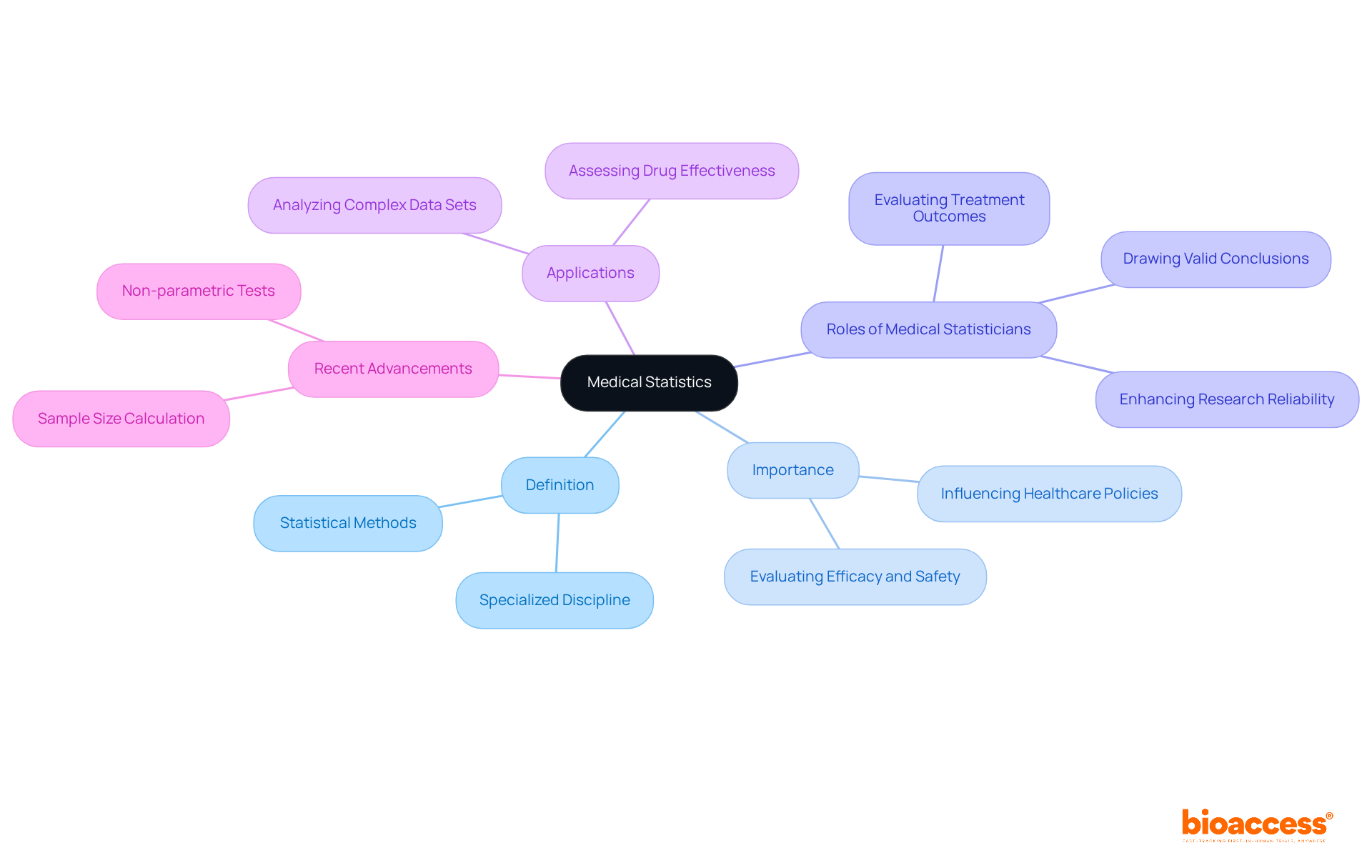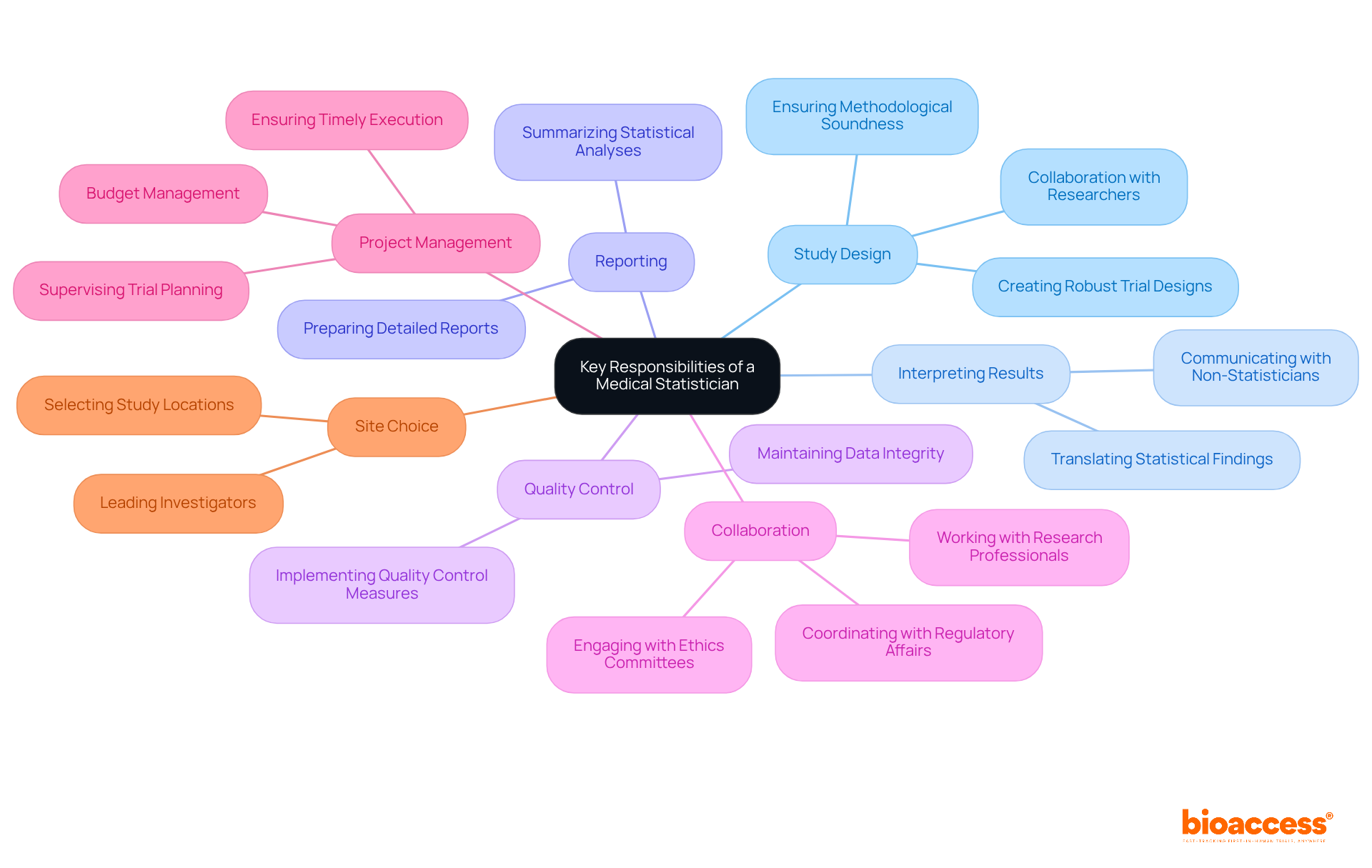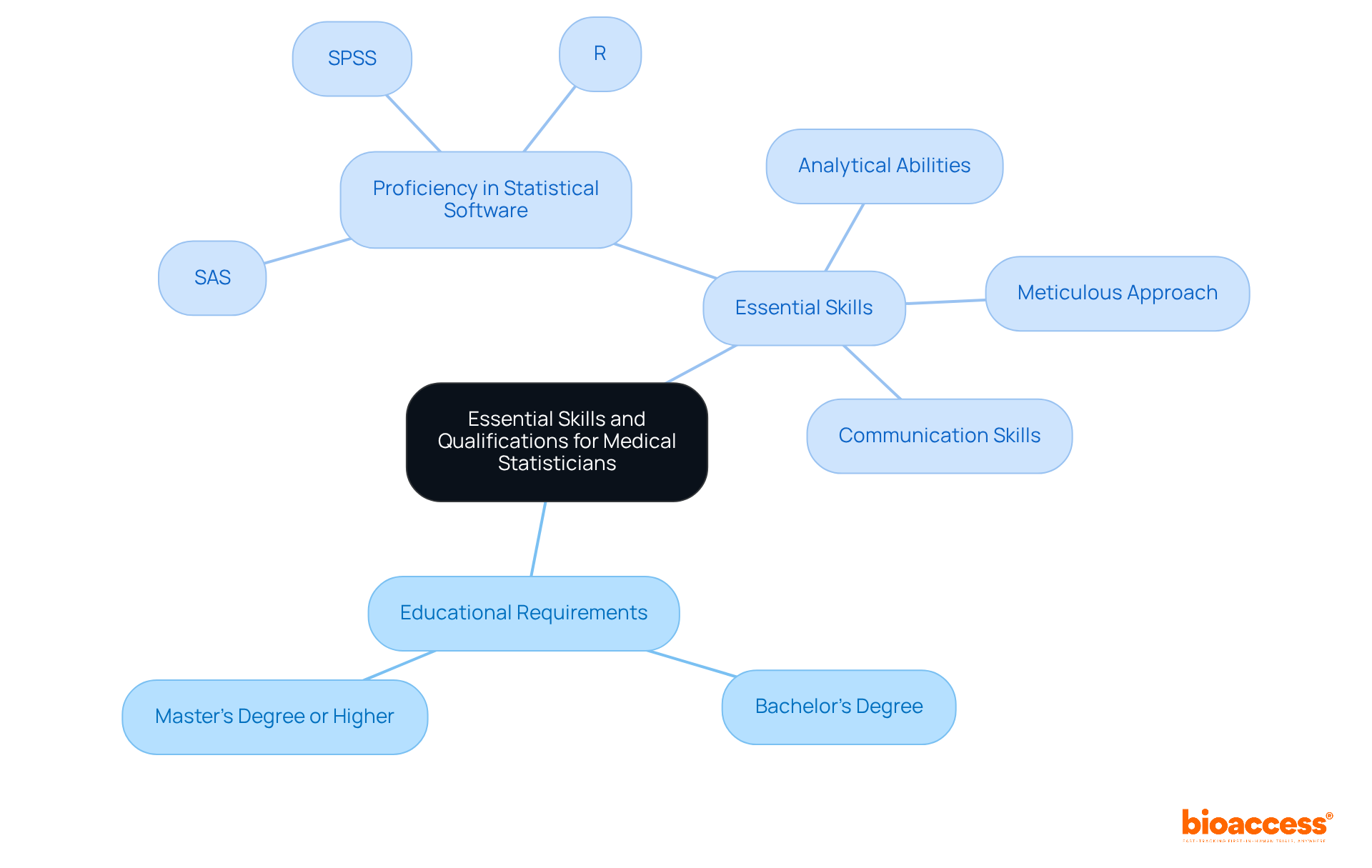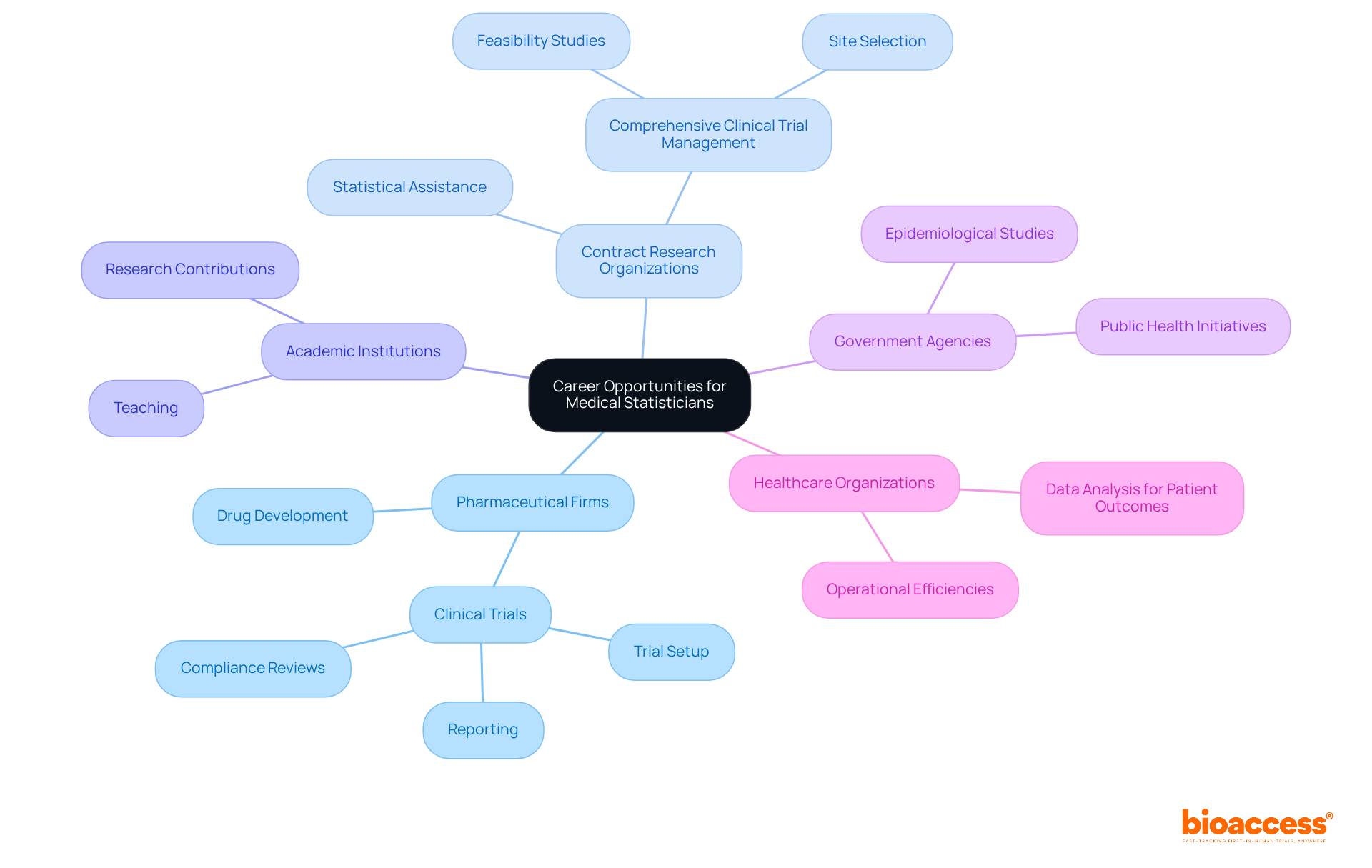


The role of a medical statistician in clinical research is undeniably critical. These professionals:
Their expertise not only enhances the validity of clinical trials but also informs healthcare decisions. This ultimately leads to improved patient outcomes and advances medical knowledge. The significance of their contributions cannot be overstated; they are essential in shaping the future of healthcare.
The intricate world of clinical research hinges on the expertise of medical statisticians, whose analytical prowess transforms raw data into valuable insights. By employing rigorous statistical methods, these professionals assume a pivotal role in assessing the effectiveness and safety of medical interventions, ultimately shaping patient care and influencing healthcare policies. As the healthcare landscape evolves, a pressing question emerges: how can medical statisticians adapt their skills to meet the escalating demands of an increasingly data-driven industry?
Medical statistics stands as a specialized discipline, often practiced by a medical statistician, that employs statistical methods to analyze and interpret data within the medical field. Its significance in medical research is profound, providing essential tools for evaluating the efficacy and safety of medical interventions. The role of a medical statistician in healthcare is crucial; it empowers researchers to draw valid conclusions from medical trials, evaluate treatment outcomes, and influence healthcare policies. By utilizing rigorous statistical methods, the role of a medical statistician enhances the reliability of results from research studies, ensuring generalizability to larger populations, ultimately leading to improved patient care and outcomes.
For instance, statistical analysis is vital in assessing the effectiveness of a new drug compared to existing treatments. It allows researchers to evaluate evidence from collected information, facilitating informed decisions regarding patient care. Recent advancements made by medical statisticians in medical statistics, including refined methodologies for sample size calculation and the application of non-parametric tests, have further enhanced the ability to analyze complex data sets, thereby elevating the quality of medical studies. As healthcare continues to evolve, the integration of robust statistical practices remains essential in driving better patient outcomes and advancing medical knowledge.

Medical statisticians play a pivotal role in the success of clinical research projects, with responsibilities that encompass various critical aspects:
Medical statisticians utilize suitable statistical techniques for data analysis to examine information gathered during trials. Their expertise ensures that analyses are not only valid but also interpretable, which is crucial for drawing meaningful conclusions from the data.
Interpreting Results: They excel in translating complex statistical findings into understandable terms for non-statisticians, including clinical teams, stakeholders, and medical statisticians. This capacity to convey ideas clearly is essential for informed decision-making during the investigative process.
Reporting: A medical statistician prepares detailed reports and presentations summarizing statistical analyses and findings. These documents are essential for regulatory submissions and publications, ensuring that the findings are communicated clearly and accurately.
Quality Control: The medical statistician implements rigorous quality control measures to maintain data integrity, addressing any discrepancies or issues that may arise during the study. This vigilance is essential for maintaining the reliability of the findings.
Collaboration is key, as medical statisticians work closely with other team members, including research professionals, regulatory affairs specialists, and ethics committees. This partnership guarantees that all elements of the study are coordinated, promoting a unified approach to medical investigation.
Project Management: The medical statistician plays a vital role in project management by supervising the planning and execution of trials to ensure they are completed on schedule and within budget.
Site Choice: Medical analysts aid in the selection of suitable study locations and lead investigators, which is crucial for the success of the trials.
The incorporation of biostatistical knowledge throughout the trial process not only improves study design but also adds to the overall success of medical initiatives. By encouraging teamwork between medical data analysts and clinical researchers, organizations like bioaccess can enhance their research initiatives and attain more trustworthy results.

To become a successful medical statistician, individuals must have a blend of educational qualifications and essential skills. A minimum of a bachelor's degree in statistics, biostatistics, mathematics, or a related field is required, although many positions prefer candidates with a master's degree or higher. Proficiency in statistical software packages such as SAS, R, or SPSS is crucial for a medical statistician to perform effective analysis and interpretation.
Strong analytical abilities are necessary for a medical statistician to evaluate intricate information sets and derive significant conclusions. Furthermore, a meticulous approach is essential to ensure precision in information gathering, analysis, and reporting. Excellent verbal and written communication skills are vital for conveying statistical concepts to non-statistical audiences effectively.
Finally, the ability to identify issues in information and develop appropriate solutions or modifications to study designs is paramount.

The career outlook for medical statisticians is robust, presenting a wealth of opportunities across diverse sectors, including:
Pharmaceutical Firms: Statisticians play a vital role in drug development and clinical trials, where they rigorously examine trial information to ensure the validity and reliability of results. Their expertise is indispensable in navigating the complexities of trial setup, compliance reviews, and reporting, which are crucial for achieving successful outcomes.
Contract Research Organizations (CROs): Within CROs, medical analysts provide statistical assistance for various clients and projects, gaining exposure to a range of methodologies and therapeutic areas. This diverse experience proves invaluable, enabling data analysts to adapt and apply their skills across various contexts, thus reinforcing the significance of data quality and reliability in their analyses. Their involvement in comprehensive clinical trial management services, including feasibility studies and site selection, significantly enhances their professional growth.
Academic Institutions: Many statisticians engage in studies and teaching, playing a crucial role in educating the next generation of statisticians and scholars while contributing to innovative projects. Their work often emphasizes the foundational knowledge necessary for effective statistical practice, which is critical in the context of health research and its implications for local economies.
Government Agencies: Statisticians in this sector focus on public health initiatives and epidemiological studies, significantly influencing health policies and practices through statistical analysis. Their contributions are essential for informed decision-making in public health, particularly in understanding the economic growth and healthcare improvements driven by Medtech clinical studies.
Healthcare Organizations: By analyzing data, medical analysts help improve patient outcomes and enhance operational efficiencies, making their role crucial within the healthcare delivery system. As the healthcare industry increasingly relies on data-driven decision-making, the demand for skilled medical statisticians is projected to increase. Their work not only supports health outcomes but also contributes to job creation and international collaboration within the healthcare sector.
This trend fosters avenues for career growth, with opportunities to advance into senior positions such as lead biostatistician or even leadership roles within study teams, underscoring the increasing significance of statistical expertise in medical studies. For instance, a medical statistician in a CRO might lead a project that analyzes the efficacy of a new drug, thereby showcasing their impact on clinical outcomes and the overall research process.

The role of a medical statistician is integral to the success of clinical research, serving as a bridge between raw data and actionable insights that can enhance patient care and influence healthcare policies. By employing advanced statistical methods, these professionals ensure that medical trials yield valid and reliable results, ultimately contributing to the advancement of medical knowledge and improved health outcomes.
Key responsibilities of medical statisticians include:
Their collaboration with researchers and other stakeholders is essential for maintaining the integrity of clinical trials. Furthermore, their skills in communication and project management bolster the effectiveness of research initiatives. The educational qualifications and essential skills required for this profession highlight the diverse career opportunities available across various sectors, from pharmaceutical firms to government agencies.
Reflecting on the significance of medical statisticians in clinical research reveals that their expertise is vital not only for the success of individual studies but also for the broader healthcare landscape. As the demand for data-driven decision-making continues to grow, the role of medical statisticians will only become more critical. Investing in their skills and recognizing their contributions can lead to enhanced patient outcomes and a more effective healthcare system overall. Embracing the importance of medical statistics in clinical trials is a necessary step toward achieving excellence in medical research and ultimately improving public health.
What is medical statistics?
Medical statistics is a specialized discipline that employs statistical methods to analyze and interpret data within the medical field.
Why is medical statistics important in healthcare?
Medical statistics is important because it provides essential tools for evaluating the efficacy and safety of medical interventions, helping researchers draw valid conclusions from trials and influencing healthcare policies.
What role does a medical statistician play in healthcare?
A medical statistician plays a crucial role by enhancing the reliability of research results, ensuring their generalizability to larger populations, and ultimately improving patient care and outcomes.
How does statistical analysis benefit medical research?
Statistical analysis benefits medical research by allowing researchers to assess the effectiveness of new drugs compared to existing treatments and facilitating informed decisions regarding patient care.
What recent advancements have been made in medical statistics?
Recent advancements include refined methodologies for sample size calculation and the application of non-parametric tests, which enhance the ability to analyze complex data sets and improve the quality of medical studies.
How does the integration of statistical practices affect patient outcomes?
The integration of robust statistical practices is essential in driving better patient outcomes and advancing medical knowledge as healthcare continues to evolve.